Don't wanna be here? Send us removal request.
Text
Word of the day: zugzwang
n. (Chess) a situation in which the obligation to make a move in one’s turn is a serious, often decisive, disadvantage.

Image credit: Chess king by David Lapetina, Creative Commons via Wikimedia Commons.
177 notes
·
View notes
Link
HOARFROST The first frost.
FROST FLOWER Thin, spindly, unique formations of ice, seen in late autumn or early winter, when plants are first freezing.
GLAZE ICE Rain hits a roadway or surface that’s below freezing, it instantly forms ice. aka Black Ice.
HARD RIME Freezing fog combined with wind, hard rime forms windward (wind-facing) surfaces.
THUNDERSNOW Thunderstorm with snow.
SNOWPACK The snow under the snow.
FIRN Years and years of snowpack.
ALBEDO The fraction of the sun’s radiation reflected from the earth’s surface.
GLORIOLE A “halo” or “icebow,” this optical phenomenon causes a bright circle or rainbow around the sun or moon.
PARHELIA Aka “sun dogs” are bright spots occurring 22 degrees away and the same distance above the horizon as the sun.
PARASELENE The night-time equivalent of the parhelia, “moondogs”.
365 notes
·
View notes
Link
ABYSSINIAN MEDAL Military slang, introduced after the Abyssinian War, for a button in the abdomen area “gone astray from its buttonhole.” This is probably what happens to your vest-wearing uncle after a hearty Thanksgiving meal.
AMEN CORNER A California term for a church.
BASKET OF ORANGES This phrase, which referred to a pretty woman, originated in Australia before making its way to England. “A metaphor founded on another metaphor,” author Andrew Forrester writes, “the basket of oranges being a phrase for the discovery of nuggets of gold in gold fields.”
BEER BOTTLE Not something you drink out of, but a street term for “a stout, red-faced man.”
CAN’T YOU FEEL THE SHRIMP? Cockney, from 1877, meaning “smell the sea.”
CHEEK-ACHE “Blushing or turning red in the face rather from the meanness of another than your own.”
CUT A FINGER A lower-class phrase meaning “to cause a disagreeable odor.”
DAMNED GOOD SWINE UP A term from 1880, “suspected to be of American origin,” for a loud quarrel.
DIMBER-DAMBER A street term meaning “smart, active, adroit. One of the alliterative phrases with absolutely no meaning.”
FOOT-AND-MOUTH DISEASE A Lancashire term for “swearing followed by kicking.”
MOUTH-PIE A street term for scolding, as delivered by a woman.
NURSE THE HOE-HANDLE A term from agricultural American meaning “lazy.” You’re not being a lump on your couch—you’re nursing the hoe-handle!
RAKED FORE AND AFT Desperately in love.
SPONGE IT OUT This term, used beginning in 1883, meant “forget it.”
START A JOLLY To lead applause. The next time you do the slow clap, tell everyone you’re starting a jolly.
1K notes
·
View notes
Link
Afternoonified A society word meaning “smart.” Forrester demonstrates the usage: “The goods are not ‘afternoonified’ enough for me.”
Arfarfan’arf A figure of speech used to describe drunken men. “He’s very arf’arf’an’arf,” Forrester writes, “meaning he has had many ‘arfs,’” or half-pints of booze.
Back slang it Thieves used this term to indicate that they wanted “to go out the back way.”
Bags o’ Mystery An 1850 term for sausages, “because no man but the maker knows what is in them. … The ‘bag’ refers to the gut which contained the chopped meat.”
Bang up to the elephant This phrase originated in London in 1882, and means “perfect, complete, unapproachable.”
Batty-fang Low London phrase meaning “to thrash thoroughly,” possibly from the French battre a fin.
Benjo Nineteenth century sailor slang for “A riotous holiday, a noisy day in the streets.”
Bow wow mutton A naval term referring to meat so bad “it might be dog flesh.”
Bricky Brave or fearless. “Adroit after the manner of a brick,” Forrester writes, “said even of the other sex, ‘What a bricky girl she is.’”
Bubble Around A verbal attack, generally made via the press. Forrester cites The Golden Butterfly: “I will back a first-class British subject for bubbling around against all humanity.”
Butter Upon Bacon Extravagance. Too much extravagance. “Are you going to put lace over the feather, isn’t that rather butter upon bacon?”
Cat-lap A London society term for tea and coffee “used scornfully by drinkers of beer and strong waters … in club-life is one of the more ignominious names given to champagne by men who prefer stronger liquors.”
Church-bell A talkative woman.
Chuckaboo A nickname given to a close friend.
Collie shangles Quarrels. A term from Queen Victoria’s journal, More Leaves , published in 1884: “At five minutes to eleven rode off with Beatrice, good Sharp going with us, and having occasional collie shangles (a Scotch word for quarrels or rows, but taken from fights between dogs) with collies when we came near cottages.”
Cop a Mouse To get a black eye. “Cop in this sense is to catch or suffer,” Forrester writers, “while the colour of the obligation at its worst suggests the colour and size of the innocent animal named.”
Daddles A delightful way to refer to your rather boring hands.
Damfino This creative cuss is a contraction of “damned if I know.”
Dizzy Age A phrase meaning “elderly,” because it “makes the spectator giddy to think of the victim’s years.” The term is usually refers to “a maiden or other woman canvassed by other maiden ladies or others.”
Doing the Bear “Courting that involves hugging.”
Don’t sell me a dog Popular until 1870, this phrase meant “Don’t lie to me!” Apparently, people who sold dogs back in the day were prone to trying to pass off mutts as purebreds.
Door-knocker A type of beard “formed by the cheeks and chin being shaved leaving a chain of hair under the chin, and upon each side of mouth forming with moustache something like a door-knocker.”
Enthuzimuzzy “Satirical reference to enthusiasm.” Created by Braham the terror, whoever that is.
Fifteen puzzle Not the game you might be familiar with, but a term meaning complete and absolute confusion.
Fly rink An 1875 term for a polished bald head.
Gal-sneaker An 1870 term for “a man devoted to seduction.”
Gas-Pipes A term for especially tight pants.
Gigglemug “An habitually smiling face.”
Got the morbs Use of this 1880 phrase indicated temporary melancholy.
Half-rats Partially intoxicated.
Jammiest bits of jam “Absolutely perfect young females,” circa 1883.
Kruger-spoof Lying, from 1896.
Mad as Hops Excitable.
Mafficking An excellent word that means getting rowdy in the streets.
Make a stuffed bird laugh “Absolutely preposterous.”
Meater A street term meaning coward.
Mind the Grease When walking or otherwise getting around, you could ask people to let you pass, please. Or you could ask them to mind the grease, which meant the same thing to Victorians.
Mutton Shunter This 1883 term for a policeman is so much better than “pig.”
Nanty Narking A tavern term, popular from 1800 to 1840, that meant great fun.
Nose bagger Someone who takes a day trip to the beach. He brings his own provisions and doesn’t contribute at all to the resort he’s visiting.
Not up to Dick Not well.
Orf chump No appetite.
Parish Pick-Axe A prominent nose.
Podsnappery This term, Forrester writers, describes a person with a “wilful determination to ignore the objectionable or inconvenient, at the same time assuming airs of superior virtue and noble resignation.”
Poked Up Embarrassed.
Powdering Hair An 18th century tavern term that means “getting drunk.”
Rain Napper An umbrella.
Sauce-box The mouth.
Shake a flannin Why say you’re going to fight when you could say you’re going to shake a flannin instead?
Shoot into the brown To fail. According to Forrester, “The phrase takes its rise from rifle practice, where the queer shot misses the black and white target altogether, and shoots into the brown i.e., the earth butt.”
Skilamalink Secret, shady, doubtful.
Smothering a Parrot Drinking a glass of absinthe neat; named for the green color of the booze.
Suggestionize A legal term from 1889 meaning “to prompt.”
Take the Egg To win.
Umble-cum-stumble According to Forrester, this low class phrase means “thoroughly understood.”
Whooperups A term meaning “inferior, noisy singers” that could be used liberally today during karaoke sessions.
12K notes
·
View notes
Link
Bed Load Solid particles, like the pebbles in a stream, that are carried along by flowing water.
Titbits The British spelling for the word “tidbits.” Tit-Bits was the name of of a British weekly magazine published from 1881 to 1984.
Loose Smutt A fungus that attacks wheat crops.
Oxpecker A small bird native to sub-Saharan Africa. Also known as tick birds, they eat parasites that infest the hides of livestock.
Dick Test If your doctor suspects you have scarlet fever, you may be given this diagnostic test invented by Dr. George Dick and his wife Gladys in 1924.
Vaginicola A singled-celled organism found in pond water.
Crack Spread The difference in value between unrefined crude oil and the products that can be made by refining, or “cracking” the oil.
F-holes The f-shaped sound holes cut into the front of violins, cellos, and other stringed instruments.
Rump Party In British politics, when one faction of a political party breaks away to merge with or form a new party, the faction left behind is known as the “rump party.”
Urinator A person who dives underwater in search of pearls, sunken treasure, or other riches.
Spermophile A genus, or grouping of more than 20 species of ground squirrel.
Crap Mats The name of a mountain in the Swiss Alps.
Fucoid An adjective that means “having to do with seaweed.”
Fucose A type of sugar found in human breast milk and in seaweed.
Titubate To stumble, either in step or in speech.
Dickcissel A species of finch native to the U.S.
931 notes
·
View notes
Photo
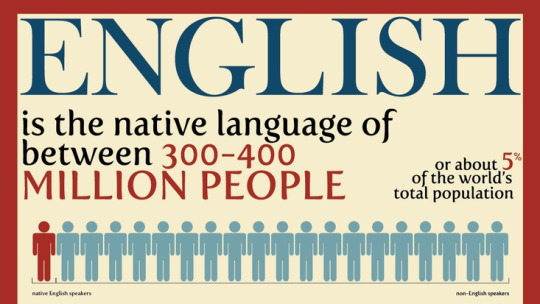
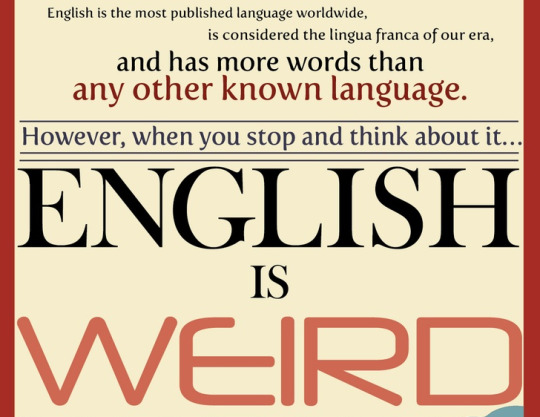
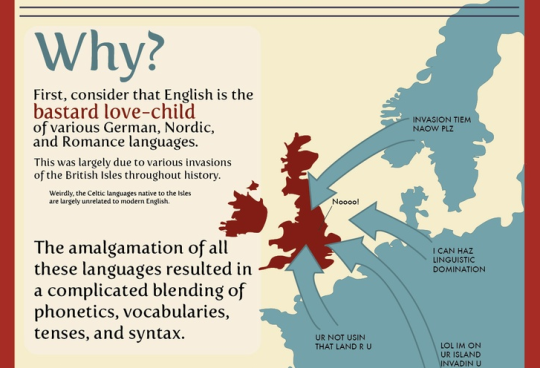
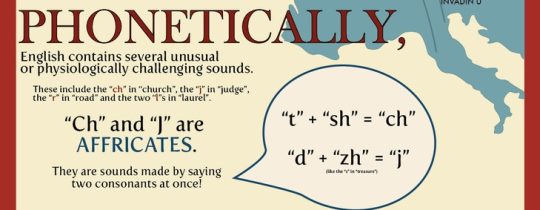
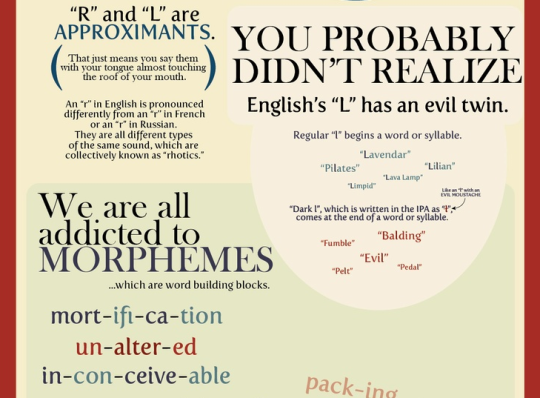
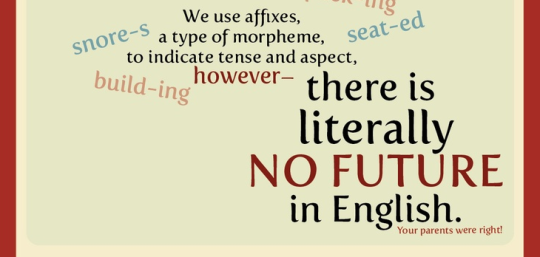

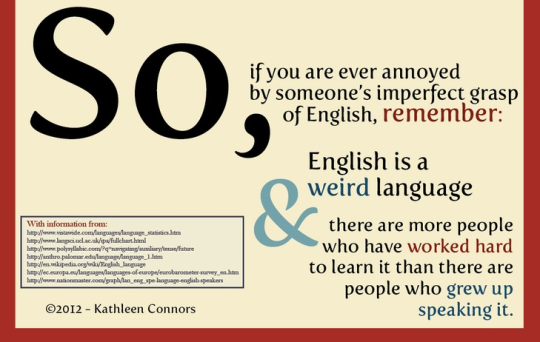
The English Language Infographic found here.
134K notes
·
View notes
Text
Open a Can of Worms
The phrase "opening a can of worms," meaning to cause trouble, originated in 1950s (or earlier) when bait shops sold live worms to fishermen. The containers back then were made of metal and had lids. Because the bait was live, however, if the lid was left ajar (even slightly so), the worms would attempt to wiggle out and get free. Once you opened up a can of worms, it was difficult to gather them all up, put them back into the can, and the keep them there while they squirmed.
0 notes
Link
Zib A stupid person with unknown political or personal opinions; a nondescript nincompoop.
Zings, the The unpleasant aftereffect of excessive drinking; a hangover; the shakes.
Zex! A warning or command to cease an improper activity in order to avoid detection.
Zool Anything attractive, well-made, or satisfying.
Zagger A cheap watch. Jewelry salesman use.
Zizz or Zizzy Sleep.
Ziggetty! An exclamation similar to “hot diggity-dam!"
Zam Short for examination.
Zoftig or Zaftig Pleasantly plump and pretty.
Zoom To get something without paying for it.
Zig-zag Drunk.
Zig-zig To have sexual intercourse.
696 notes
·
View notes
Text
If you use “quote” as a noun, I am disappointed in you because you are the reason words cannot retain their original meaning.
7K notes
·
View notes
Text
decathect
decathect: v. to withdraw one's feelings of attachment from (a person, idea or object), as in anticipation of a future loss.
I decathected from her in order to cope with her impending death.
5 notes
·
View notes
Link
Kummerspeck (German) Excess weight gained from emotional overeating. Literally, grief bacon.
Shemomedjamo (Georgian) You know when you’re really full, but your meal is just so delicious, you can’t stop eating it?
Tartle (Scots) The nearly onomatopoeic word for that panicky hesitation just before you have to introduce someone whose name you can’t quite remember.
Mamihlapinatapai (Yaghan language of Tierra del Fuego) This word captures that special look shared between two people, when both are wishing that the other would do something that they both want, but neither want to do.
Backpfeifengesicht (German) A face badly in need of a fist.
Iktsuarpok (Inuit) You know that feeling of anticipation when you’re waiting for someone to show up at your house and you keep going outside to see if they’re there yet?
Pelinti (Buli, Ghana) Your friend bites into a piece of piping hot pizza, then opens his mouth and sort of tilts his head around while making an “aaaarrrahh” noise. The Ghanaians have a word for that. More specifically, it means “to move hot food around in your mouth.”
Greng-jai (Thai) That feeling you get when you don’t want someone to do something for you because it would be a pain for them.
Mencolek (Indonesian) You know that old trick where you tap someone lightly on the opposite shoulder from behind to fool them? The Indonesians have a word for it.
Faamiti (Samoan) To make a squeaking sound by sucking air past the lips in order to gain the attention of a dog or child.
Gigil (Filipino) The urge to pinch or squeeze something that is irresistibly cute.
Yuputka (Ulwa) A word made for walking in the woods at night, it’s the phantom sensation of something crawling on your skin.
Zhaghzhagh (Persian) The chattering of teeth from the cold or from rage.
Vybafnout (Czech) A word tailor-made for annoying older brothers—it means to jump out and say boo.
Fremdschämen (German) ; Myötähäpeä (Finnish) The kindler, gentler cousins of Schadenfreude, both these words mean something akin to “vicarious embarrassment.”
Lagom (Swedish) Maybe Goldilocks was Swedish? This slippery little word is hard to define, but means something like, “Not too much, and not too little, but juuuuust right.”
Pålegg (Norweigian) Sandwich Artists unite! The Norwegians have a non-specific descriptor for anything – ham, cheese, jam, Nutella, mustard, herring, pickles, Doritos, you name it – you might consider putting into a sandwich.
Layogenic (Tagalog) Remember in Clueless when Cher describes someone as “a full-on Monet…from far away, it’s OK, but up close it’s a big old mess”? That’s exactly what this word means.
Bakku-shan (Japanese) Or there this Japanese slang term, which describes the experience of seeing a woman who appears pretty from behind but not from the front.
Seigneur-terraces (French) Coffee shop dwellers who sit at tables a long time but spend little money.
Ya’arburnee (Arabic) This word is the hopeful declaration that you will die before someone you love deeply, because you cannot stand to live without them. Literally, may you bury me.
Pana Po’o (Hawaiian) “Hmm, now where did I leave those keys?” he said, pana po’oing. It means to scratch your head in order to help you remember something you’ve forgotten.
Slampadato (Italian) Addicted to the UV glow of tanning salons? This word describes you.
Zeg (Georgian) It means “the day after tomorrow.” OK, we do have “overmorrow” in English, but when was the last time someone used that?
Cafune (Brazilian Portuguese) Leave it to the Brazilians to come up with a word for “tenderly running your fingers through your lover’s hair.”
Koi No Yokan (Japanese) The sense upon first meeting a person that the two of you are going to fall in love.
Kaelling (Danish) You know that woman who stands on her doorstep (or in line at the supermarket, or at the park, or in a restaurant) cursing at her children? The Danes know her, too.
Boketto (Japanese) It’s nice to know that the Japanese think enough of the act of gazing vacantly into the distance without thinking to give it a name.
L’esprit de l’escalier (French) Literally, stairwell wit—a too-late retort thought of only after departure.
Cotisuelto (Caribbean Spanish) A word that would aptly describe the prevailing fashion trend among American men under 40, it means one who wears the shirt tail outside of his trousers.
Packesel (German) The packesel is the person who’s stuck carrying everyone else’s bags on a trip. Literally, a burro.
Hygge (Danish) Denmark’s mantra, hygge is the pleasant, genial, and intimate feeling associated with sitting around a fire in the winter with close friends.
Cavoli Riscaldati (Italian) The result of attempting to revive an unworkable relationship. Translates to “reheated cabbage.”
Bilita Mpash (Bantu) An amazing dream. Not just a “good” dream; the opposite of a nightmare.
Litost (Czech) Milan Kundera described the emotion as “a state of torment created by the sudden sight of one’s own misery.”
Luftmensch (Yiddish) There are several Yiddish words to describe social misfits. This one is for an impractical dreamer with no business sense.
11K notes
·
View notes
Link
WAZZOCK Wazzock was a particularly prevalent—and particularly loutish—insult in the 1990s. At the time, “lad culture” ran throughout British music and television, and wazzock, a North-England accented contraction of the sarcastic wiseacre (a know-it-all) became a powerful tool to shoot people down in an argument.
LUMMOX Though the etymology of lummox is heavily disputed, one thing is for certain: It came from East Anglia, the coastal outcrop of Britain above London. There, around 1825, someone threw out the word as an insult, and it stuck, becoming a typically British go-to term. Some linguists believe it comes from the verb lummock, which typified a lummox: it means a clumsy oaf.
SKIVER Skivers and shirkers are one and the same. Someone who manages to duck under any responsibility and loaf around, doing very little, is a skiver. The origins of this particular insult are contested: some think it’s from an Old Norse word—skifa—meaning “slice,” whereby the worker slices off as much work as possible.
MINGER Often hurled at the opposite sex, to call someone a minger is to say they are objectively unattractive. Though etymologists struggle to agree where the word came from, it seems likely that it stems from the Old Scots word meng, meaning “sh**.” We didn’t say it was pretty.
NINCOMPOOP For such a colloquial word, nincompoop actually has a very learned past. Samuel Johnson, the compiler of England’s first proper dictionary, claims the word comes from the Latin phrase non compos mentis (“not of right mind”), and was originally a legal term.
PILLOCK As words are used more regularly, the laziness of pronunciation can often warp them slightly. So it was with pillock. Originally pillicock (a Norwegian slang word for penis), the word has since been condensed to plain old pillock—though its meaning remains.
CLOD HOPPER According to the brilliant Dictionary of the Vulgar Tongue, dating back to 1811 and compiled by Captain Francis Grose, a clod hopper refers to a country farmer or ploughman—with the implication nowadays that you’re slow witted and bumbling.
DUNAKER Grose’s Dictionary of vulgarities is a rich seam of overlooked insults. In the 200 years since it was published, there have been several terms that have fallen out of favor. One of them is dunaker, a common thief of cows and calves.
GIT By calling someone a git, you’re invoking the old Scots word get, which means “bastard.” When it came down south of the border, it lost its harsh vowel sound and became something softer, albeit with the required spikiness in.
1K notes
·
View notes



